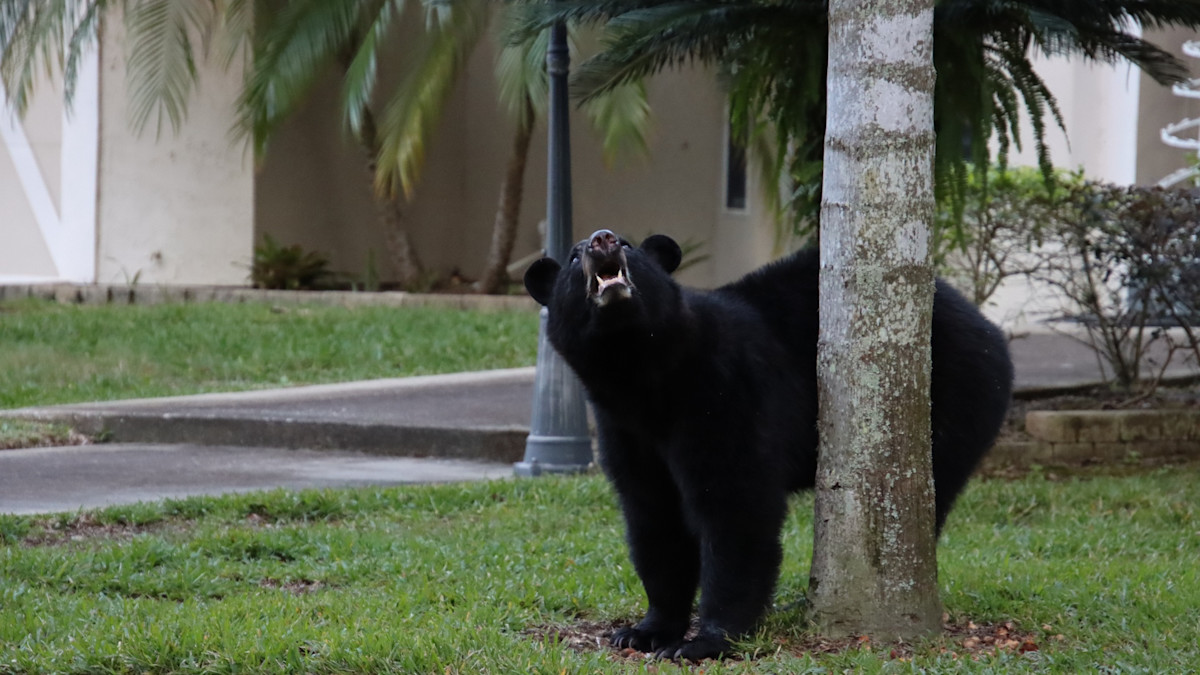
The Florida legislature is considering a bill that would expand the situations in which a resident could legally kill a black bear. The bill’s author says it’s necessary due, in part, to bears “on crack.”
“We’re talking about the ones that are on crack, and they break your door down, and they’re standing in your living room growling and tearing your house apart,” Republican State Congressman Jason Shoaf told a legislative committee last week.
“When you run into one of these crack bears, you should be able to shoot it, period. And you shouldn’t have to pause or be afraid you’re gonna get arrested or harassed or pay fines. That’s just crazy,” he continued.
House Bill 87 would shield a person from administrative, civil, or criminal penalties if they kill a black bear while believing that their actions were necessary “to avoid an imminent threat of death or serious bodily injury to himself or herself or another, an imminent threat of death or serious bodily injury to a pet, or substantial damage to a dwelling as defined in s. 776.013(5).”
The bill clarifies that to make this defense, the person must not intentionally or recklessly place themselves or their pet in a situation in which they would be likely to need to use lethal force. It also prohibits anyone who kills a bear from possessing, selling, or disposing of the bear or its parts, and requires them to inform the Florida Wildlife Commission (FWC) within 24 hours.
Florida common law already allows for bears to be killed in self-defense. Just last August, a man killed a black bear that charged him, and FWC officials concluded that the man acted to protect his family and his dog. But Shoaf points out that people are still sometimes prosecuted for what they say are self-defense killings, and that people shouldn’t be worried about being fined or thrown in prison for defending themselves or their properties.
“We shouldn’t have it in the back of every person’s mind, man, am I going to go to jail if I shoot this bear? Do I just need to run? You can’t outrun a bear. That should not even be a question. We are making it crystal clear that you do not have to fear for your life, flee, or hide,” he said.
In 1998, Florida voters approved a constitutional amendment to give FWC the regulatory and executive powers of the state concerning wild animal life, freshwater aquatic life, and marine life. Because of this, the legislature is constitutionally prohibited from adopting statutes in conflict with rules adopted by FWC to execute such authority.
But Shoaf does not believe his bill violates this provision because it’s “not about bears.”
“I believe this bill is constitutional because it’s not dealing with managing a game population,” he said. “I’m not infringing on their duties. We’re simply clarifying that they as a state law enforcement entity cannot arrest, fine, penalize a Floridian for defending themselves.”
While Floridians already enjoy a common law right to kill a bear if they’re threatened with death or serious bodily injury, the bill does expand the scope of legal bear killings to situations in which a bear is “substantially” damaging a dwelling as defined in s. 776.013(5). This statute defines “dwelling” as a building of any kind that has a roof over it and is designed to be occupied at night, including a tent and mobile dwellings.
Shoaf says he was inspired to propose this bill after hearing from so many of his constituents about negative interactions with bears in his district in Florida’s panhandle. He blames the FWC for not managing bears as they do other abundant species.
“I would love to see FWC mirror the system they have in place for alligators, where they issue tags, where they manage the population,” he said. “If they would do that, I am convinced we would not have bears in our homes.”
Florida hunters would no doubt jump at the opportunity to address the situation, but bears are a contentious topic in the Sunshine State. Black bears were removed from the state’s threatened species list in 2012, and current estimates put the population at 4,050 individuals.
The state held a hunt in 2015, but hunters reached their quotas after just two days. Rather than be encouraged that the population was even larger than expected, the general public hammered the commission with angry messages, and the state hasn’t held a hunt since.
“One might argue that bills like this are the result of a refusal to use hunting to manage a wild population,” said MeatEater’s Ryan Callaghan in Episode 243 of his podcast, Cal’s Week in Review. “Hunting doesn’t resolve all bear conflicts, but it is a useful tool in managing the number of bruins in a particular area. Now, it looks like the legislature might step in with their own solution.”
MeatEater reached out to Shoaf’s office asking whether the congressman had a specific situation in mind when he mentioned bears on crack, but did not receive a reply by the time of publication. We were not able to find any instance of a bear on a drug of any kind threatening a Floridian, but Shoaf could have been thinking of the 2023 cinematic masterpiece, Cocaine Bear.





